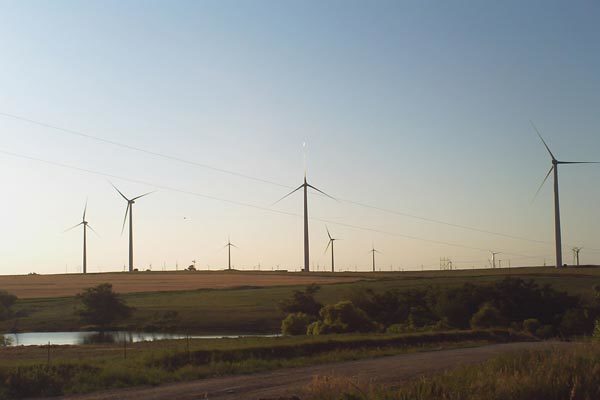The Kansas House of Representatives Energy and Environment Committee held hearings Feb. 14 to consider testimony regarding legislation to soften renewable power mandates in the Sunflower State.
Escalating Mandates
Legislation passed in 2009 requires Kansas electricity providers to generate 15 percent of the state’s electricity through renewable sources by 2015 and 20 percent by 2020.
HB 2241 would extend the 15 percent deadline to 2018 and eliminate the 20 percent requirement.
Wind Power Jobs
Testifying first, wind power industry staffers told the committee the wind power industry, which produces 99 percent of the state’s renewable power, employs hundreds of people and indirectly supports thousands of additional jobs. They also asserted payments to farmers for the right to place turbines on farmland bring additional revenue to Kansas residents.
‘Unwelcome’ Treatment
Switching from carrot to stick, wind power representatives warned any action to delay or soften renewable power mandates would send a signal to the wind power industry that it is not welcome in Kansas. Wind power companies would respond to such unwelcome treatment by taking their power generation and job creation elsewhere, the wind industry representatives promised.
Higher Prices, Fewer Jobs
Responding to the wind industry representatives, Michael Head, a research economist with the Beacon Hill Institute, pointed out jobs created in the wind power industry come at the expense of those destroyed in the conventional energy industry. In addition, he said, forcing electricity consumers to divert money from other potential purchases to pay the higher prices of wind power means the mandates destroy still more jobs throughout the Kansas economy.
Citing a Kansas-specific economic study published by the Beacon Hill Institute, Head reported the state’s renewable power mandates will raise electricity prices by 45 percent over baseline projections and eliminate 12,000 jobs compared to baseline projections.
Head also pointed out payments to Kansas farmers for the placement of wind turbines are funded by everybody else in the state, who must pay higher prices for wind power. Accordingly, payments to farmers hosting wind turbines does not represent money flowing into the state, but instead money being redistributed within the state.
“This is forcing the many to give money to the few, and the poor to give money to the rich,” Head said.
State at Competitive Disadvantage
Former Kansas Rep. Charlotte O’Hara testified Kansas electricity prices were relatively stable before the 2009 renewable power mandates but have risen dramatically since then. Energy prices are a primary factor in a state’s economic success or failure, O’Hara noted, and the Kansas renewable power mandates are keeping electricity prices substantially higher than those in neighboring states.
O’Hara compared rising energy prices and resultant job pressures in Kansas to economic prosperity in North Dakota. Instead of stifling conventional energy production and mandating wind power production, North Dakota is experiencing rapid job creation and prosperity as a result of vibrant conventional energy production. O’Hara noted Kansas also has ample conventional energy resources that could drive economic prosperity, but renewable power mandates are preventing this from happening.
Rapid Price Increases
Heartland Institute Senior Fellow James Taylor pointed out Kansans used to benefit from electricity prices substantially lower than the national average, but renewable power mandates have driven rapid price increases in Kansas since 2009 even as national electricity prices remained relatively flat. As a result, the U.S. Energy Information Administration reports Kansans now pay the highest electricity prices in the region.
If Kansans merely paid the same price for electricity that Nebraskans do, the savings would amount to $300 per Kansas household every year, Taylor noted. If Kansans paid the same price for electricity as Oklahomans, the savings would amount to $600 per Kansas household every year.
Welcome Mat or Extortion?
Responding to the wind power representatives’ assertion that softening the renewable power mandate would tell the wind industry it is no longer welcome in Kansas, Taylor noted no conventional energy producers make the audacious assertion that government must pass laws forcing consumers to purchase their product in order to feel welcome in the state.
“Not a single producer of conventional energy comes before this legislature and demands guaranteed market share under the threat of picking up its business and leaving the state,” said Taylor. “All conventional energy producers want is an opportunity to compete in a free economy. The wind power industry’s aggressive hostility to such a free economy demonstrates just how expensive and uncompetitive wind power truly is.”
Mandates Hurt Most Kansans
After Taylor’ testimony, a committee member asserted environmental activist groups and utility companies both favor the renewable power mandates, so therefore everyone with “skin in the issue” approves the mandates. And if everyone affected approves the mandates, “think tanks” such as the Beacon Hill Institute and the Heartland Institute are out of touch, the committee member said.
“I respectfully disagree,” said Taylor. “Everyone who is an electricity consumer or who pays taxes that are handed over to the wind power industry has skin in the issue. Environmental activist groups and the utilities who make a greater profit providing expensive wind power than they do by providing more affordable conventional power comprise the minority of people and groups in this state with skin in the issue. Forcing Kansans to purchase more expensive renewable power harms almost everyone with skin in the issue.”
Taylor Smith ([email protected]) is a policy analyst for The Heartland Institute.





